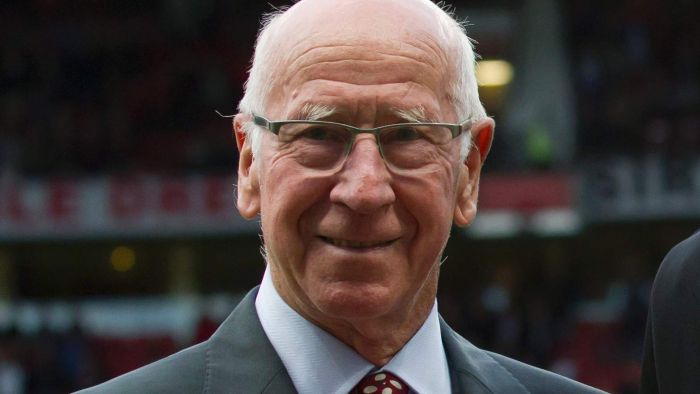Manchester United and England great Sir Bobby Charlton has been diagnosed with dementia.
Key points:
- Sir Bobby Charlton is the latest of England’s World-Cup-winning players to be diagnosed with dementia
- Recent have studies found former football players are more likely to die from dementia
- Sir Bobby played for Manchester United for almost his entire career
One of football’s greatest players, Sir Bobby was part of the England team that won the 1966 World Cup.
The 83-year-old was capped 106 times for England, scoring 49 goals — a record only recently bettered by Wayne Rooney, who also surpassed his tally of 249 goals for Manchester United.
Charlton survived the 1958 Munich air disaster that killed eight United teammates and was part of the rebuilding of the club, scoring twice in the 1968 European Cup final win over Benfica.
That victory helped Sir Bobby become a legend at United as part of “The United Trinity” alongside George Best and Denis Law. He was knighted in 1994.

He played for the club 758 times and now has the south stand at the club’s Old Trafford home named after him.
“Everyone at Manchester United is saddened that this terrible disease has afflicted Sir Bobby Charlton and we continue to offer our love and support to Sir Bobby and his family,” United said in a statement on Sunday.
List of former players with dementia grows
The announcement came two days after Nobby Stiles, who won the 1966 World Cup and 1968 European Cup as Charlton’s teammate, died after battling dementia.
In July, Sir Bobby’s brother, fellow England World Cup winner Jack, died after suffering from the disease.
“Yet another hero of our 1966 World Cup winning team has been diagnosed with dementia, perhaps the greatest of them all, Sir Bobby,” former England striker Gary Lineker tweeted.
Sir Bobby’s diagnosis will raise fresh concerns about the game’s health risks.
Research published in 2019 by the University of Glasgow found former male professional football players had a 3.5 times higher rate of death from neurodegenerative diseases such as Alzheimer’s or Parkinson’s.




In absolute terms, that risk remained relatively small — 1.7 per cent among former players and 0.5 per cent for the comparison group. Former players were also more likely to be prescribed dementia medicines than the others were.
Researchers compared the causes of death of 7,676 Scottish men who played football with 23,000 similar men from the general population born between 1900 and 1976.
Over a median of 18 years of study, 1,180 players and 3,807 of the others died.
They found footballers were less likely to die of common causes such as heart disease and cancer compared with the general population but were more likely to die from dementia.
Campaigning to discover more about the long-term impact of head injuries in football has been led in England by the family of former England striker Jeff Astle, whose death at age 59 in 2002 was attributed to repeatedly heading old-style heavy, leather balls.
In 2017, a British study of brains of a small number of retired players who developed dementia highlighted the degenerative damage possibly caused by repeated blows to the head.
ABC/wires







